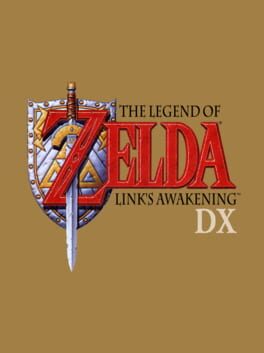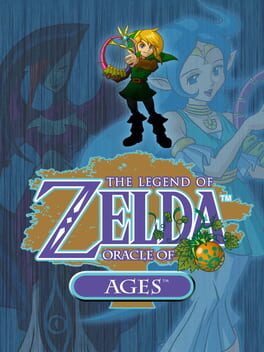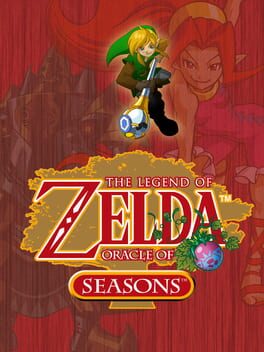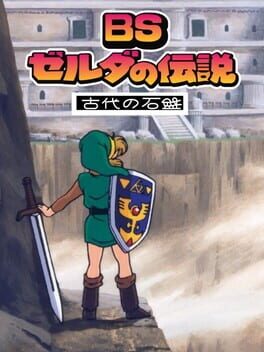

An expanded game of The Legend of Zelda: Link's Awakening
The Legend of Zelda: Link's Awakening DX is an updated re-release of Link's Awakening with several new additions, the most notable of which being the entire game is now in color.
Also in series
Reviews View More
The Legend of Zelda: Link's Awakening DX is a masterful remake of the Game Boy classic. Its charming visuals, captivating story, and meticulously designed dungeons blend seamlessly to create a timeless adventure. This enhanced version boasts vibrant colors and a new dungeon, offering even seasoned Zelda veterans a fresh and rewarding experience on Koholint Island.
The Legend of Zelda has a strong case as the greatest overall gaming franchise, so much so that its a victim of suffering from success at times. That is to say, this series has so many incredible games that even a great classic entry like Link's Awakening can easily go overlooked, in part due to its advanced age, but also on account of at least a handful of Zelda games considered even better still. In a vacuum from the greater franchise however, what we have here is one of the very few remaining Game Boy games that still holds up well in the present day, a remarkable feat.
The most striking aspect of Link's Awakening to me is just how impressive it is for a game of such high quality to exist on limited and primitive hardware. In development, this game began as a side project to port A Link to the Past to the handheld Game Boy, but soon grew into its own unique game with an island setting completely independent of the Hyrule we'd come to know. While measuring up to its legendary console predecessor may have been an impossible task, Link's Awakening carved itself a distinct identity all its own, even introducing some series staples that would carry over into the N64-era 3D games to follow.
Link washes up on the shore of Koholint Island, and is informed by an owl that in order to return home, he must awaken the Wind Fish, encased in a massive egg atop Mt. Tamaranch. This entails an Earthbound-style quest of collecting eight melodies, or in this case eight magic instruments, needed to play the song to awaken this mythical creature. This island setting is of a smaller scale than usual, but the classic Zelda dungeons are here, and they're mostly pretty good. The only dungeon I found to be especially annoying/confusing was The Eagle's Tower. Collapsing pillars of the dungeon to render higher areas accessible is a cool dungeon concept, but in practice its convoluted to understand just how the dungeon changes each time, and lugging around iron balls to accomplish this is pretty tedious in itself. The typical Zelda gameplay loop of finding a new item in each dungeon that must be used to solve puzzles within returns, and while most of this equipment existed in A Link to the Past, jumping around with the new Roc's Feather is really fun. Combining this with the Pegasus Boots allows Link to travel super quickly across the small screen.
Koholint Island itself is lighthearted and cozy, also notable for the unexpected presence of Mario enemies like Chain Chomps and Goombas. It's fun to see this rare crossover, but these guys don't seem like they belong in the Zelda universe at all. And that is because they aren't. Yes, as Link collects more instruments it is progressively revealed that Koholint Island and everyone on it is actually a dream. The "it was all just a dream" ending is typically a cheap narrative no-no, but in Link's Awakening its framed in a bittersweet way, the player burdened with this knowledge ahead of time means that by completing their quest they'll also be essentially removing the Koholint community they've come to know from existence. Realistically though, the only character that will truly be missed is Marin, she's the sweet and spunky girl who initially finds Link shipwrecked, and helps on his quest several times throughout the game. My favorite of these is easily her journey to the Animal Village. Featuring all-stars including the Chef Bear and the Sleepy Walrus that only Marin can sing to wake up, this is an all-time Zelda location just for how delightfully cartoony it is alone.
There are other quirky product-of-the-time things with Link's Awakening, like taking in-game pictures meant to be printed out with the Game Boy Printer, kinda wish I was there to experience that when it was new and cool. Any further complaints with the game are fairly nitpicky and fall under the subjectivity of puzzle-type games being either too cryptic at times to figure out how to progress, or merely the player's fault for being unable to solve it. There's an old man Link can phone for hints, but sometimes his advice basically just amounts to "idk just figure it out yourself lol." I found the final boss underwhelming as well for what its worth, and deciphering the path to reach this final confrontation felt unnecessarily obtuse.
The Game Boy was surely bursting at the seams trying to fit a substantial full-length adventure in that clunky cartridge, but Link's Awakening found a way. Even the music is pleasant, despite playing from speakers that often were a headache simulator, "Tal Tal Heights" and "Ballad of the Windfish" stand out especially. This game has a strong case for the best on the original Game Boy (Color), and holds up better compared to the rest of its franchise than I ever could have expected, an exception where it's okay to be just a dream.
4.0/5.0
The most striking aspect of Link's Awakening to me is just how impressive it is for a game of such high quality to exist on limited and primitive hardware. In development, this game began as a side project to port A Link to the Past to the handheld Game Boy, but soon grew into its own unique game with an island setting completely independent of the Hyrule we'd come to know. While measuring up to its legendary console predecessor may have been an impossible task, Link's Awakening carved itself a distinct identity all its own, even introducing some series staples that would carry over into the N64-era 3D games to follow.
Link washes up on the shore of Koholint Island, and is informed by an owl that in order to return home, he must awaken the Wind Fish, encased in a massive egg atop Mt. Tamaranch. This entails an Earthbound-style quest of collecting eight melodies, or in this case eight magic instruments, needed to play the song to awaken this mythical creature. This island setting is of a smaller scale than usual, but the classic Zelda dungeons are here, and they're mostly pretty good. The only dungeon I found to be especially annoying/confusing was The Eagle's Tower. Collapsing pillars of the dungeon to render higher areas accessible is a cool dungeon concept, but in practice its convoluted to understand just how the dungeon changes each time, and lugging around iron balls to accomplish this is pretty tedious in itself. The typical Zelda gameplay loop of finding a new item in each dungeon that must be used to solve puzzles within returns, and while most of this equipment existed in A Link to the Past, jumping around with the new Roc's Feather is really fun. Combining this with the Pegasus Boots allows Link to travel super quickly across the small screen.
Koholint Island itself is lighthearted and cozy, also notable for the unexpected presence of Mario enemies like Chain Chomps and Goombas. It's fun to see this rare crossover, but these guys don't seem like they belong in the Zelda universe at all. And that is because they aren't. Yes, as Link collects more instruments it is progressively revealed that Koholint Island and everyone on it is actually a dream. The "it was all just a dream" ending is typically a cheap narrative no-no, but in Link's Awakening its framed in a bittersweet way, the player burdened with this knowledge ahead of time means that by completing their quest they'll also be essentially removing the Koholint community they've come to know from existence. Realistically though, the only character that will truly be missed is Marin, she's the sweet and spunky girl who initially finds Link shipwrecked, and helps on his quest several times throughout the game. My favorite of these is easily her journey to the Animal Village. Featuring all-stars including the Chef Bear and the Sleepy Walrus that only Marin can sing to wake up, this is an all-time Zelda location just for how delightfully cartoony it is alone.
There are other quirky product-of-the-time things with Link's Awakening, like taking in-game pictures meant to be printed out with the Game Boy Printer, kinda wish I was there to experience that when it was new and cool. Any further complaints with the game are fairly nitpicky and fall under the subjectivity of puzzle-type games being either too cryptic at times to figure out how to progress, or merely the player's fault for being unable to solve it. There's an old man Link can phone for hints, but sometimes his advice basically just amounts to "idk just figure it out yourself lol." I found the final boss underwhelming as well for what its worth, and deciphering the path to reach this final confrontation felt unnecessarily obtuse.
The Game Boy was surely bursting at the seams trying to fit a substantial full-length adventure in that clunky cartridge, but Link's Awakening found a way. Even the music is pleasant, despite playing from speakers that often were a headache simulator, "Tal Tal Heights" and "Ballad of the Windfish" stand out especially. This game has a strong case for the best on the original Game Boy (Color), and holds up better compared to the rest of its franchise than I ever could have expected, an exception where it's okay to be just a dream.
4.0/5.0
This review contains spoilers
In 2019, back in those dreadful days when it was normal and expected of one to have a daily commute, I was playing Link's Awakening on my way home. Tired after a long day's work, I wasn't keen on making any significant progress, just wanted to look around. In the game's main hub town I've found Marin, who began to sing Ballad of the Windfish, a song I've heard a long-long time ago. I sat there, transfixed. I was in there, immersed if you will, a sensation the PS4 that waited for me at home sadly couldn't replicate with all of its hyper realistic graphics.
That's a cliche, I know, but I can't help being sentimental. I watched the little doggie hop about, the butterflies float about, the classic flowers bounce up and down, enjoyed my ability to move about without stopping the song, and goddamn. How did these wizards manage to squeeze this much life into a gameboy game?
After a bit, the magic was gone, I was staring at pixels and the sharp 8-bit sounds made my ears bleed, so I put the game away. But I was not the same after that. It was as if an alternate timeline, when I had Nintendos instead of (or alongside) Playstations as a child, converged with this one. I was, as Scallops Hotel once put it, nostalgic for something I never had.
Usually when someone, as kids today say, gasses a game from their childhood up, it's hard for others to get in on it, as those games tend to be enhanced by the vividness of a child's perception and imagination. I've been burned by Zeldas many times before on that front. Yet this game did it for me, first on an emotional level, and then on an intellectual one as well. It expresses childhood itself in a way only a videogame could.
At the end, after the player wakes the Windfish up, the entire game's world vanishes, being only said fish's (mammal's) dream. The bittersweet feeling one gets from it is analogous with that from growing up. Both things are something one has to willingly do, put effort towards. You don't wanna do it too fast, you want to cherish what you have and be in the moment, but you can't linger for too long. In a videogame, not making progress eventually makes the artifice obvious, breaks the magic of its presentation. In real life, staying an overdue kid is just not pretty. Look at Seth Rogen.
Even if it's gone, even if you can't go to places where you grew up or see people you remember, even if doing things that used to make you happy don't anymore, the initial experience of it all can still be found, deep within the folds of your soul. Summon it up every now and then, like a fleeting dream, to keep your feelings alive. After all, we live inside a dream.
That's a cliche, I know, but I can't help being sentimental. I watched the little doggie hop about, the butterflies float about, the classic flowers bounce up and down, enjoyed my ability to move about without stopping the song, and goddamn. How did these wizards manage to squeeze this much life into a gameboy game?
After a bit, the magic was gone, I was staring at pixels and the sharp 8-bit sounds made my ears bleed, so I put the game away. But I was not the same after that. It was as if an alternate timeline, when I had Nintendos instead of (or alongside) Playstations as a child, converged with this one. I was, as Scallops Hotel once put it, nostalgic for something I never had.
Usually when someone, as kids today say, gasses a game from their childhood up, it's hard for others to get in on it, as those games tend to be enhanced by the vividness of a child's perception and imagination. I've been burned by Zeldas many times before on that front. Yet this game did it for me, first on an emotional level, and then on an intellectual one as well. It expresses childhood itself in a way only a videogame could.
At the end, after the player wakes the Windfish up, the entire game's world vanishes, being only said fish's (mammal's) dream. The bittersweet feeling one gets from it is analogous with that from growing up. Both things are something one has to willingly do, put effort towards. You don't wanna do it too fast, you want to cherish what you have and be in the moment, but you can't linger for too long. In a videogame, not making progress eventually makes the artifice obvious, breaks the magic of its presentation. In real life, staying an overdue kid is just not pretty. Look at Seth Rogen.
Even if it's gone, even if you can't go to places where you grew up or see people you remember, even if doing things that used to make you happy don't anymore, the initial experience of it all can still be found, deep within the folds of your soul. Summon it up every now and then, like a fleeting dream, to keep your feelings alive. After all, we live inside a dream.
This review contains spoilers
A Zelda game inspired by Twin Peaks that has nothing to do with the other Zeldas: if only spin-offs of well-known series could have the quality of this game.
Originally conceived as an adaptation of A Link to the Past, the game became something entirely different. The transition from SNES to GameBoy at the time often meant a degradation of the original product due to the technical limitations of the device. I had been traumatized by the GB version of Donkey Kong Country. Here, with Zelda, it's completely different; we're not faced with a 'lite' version. Even though the world of Link's Awakening is smaller in size than A Link to the Past, I felt more like this game added elements rather than removing them. We have more cutscenes, memorable characters, and more music (which is incredible, by the way).
Certainly, we return to a linear gameplay pattern, but the game's progression is exceptional. It feels like each 'square' of the map is used optimally. The size of the world, in my opinion, is ideal: neither too big nor too small. With each new item, we enjoy revisiting this world to discover new secrets, whereas A Link to the Past with its two parallel worlds seemed too large and confusing to me. Is Link's Awakening easier? If compared to its predecessors, the answer is clearly yes.
Spoilers: After discovering that the island is just a dream, I was struck by the fact that we view the game in a more melancholic light. Perhaps it's a metaphor for the player, but finishing the game means the disappearance of Koholint. The ambivalence in which we find ourselves is truly unique. After reading the mural, we enter the sixth dungeon and this music plays on loop, which I find particularly sad: https://www.youtube.com/watch?v=4X6UqQDmjBk
It's the first Zelda game that I played and finished (thanks to a magazine) that I absolutely loved. Almost 25 years later, the experience is almost the same. I played it with a smile.
Originally conceived as an adaptation of A Link to the Past, the game became something entirely different. The transition from SNES to GameBoy at the time often meant a degradation of the original product due to the technical limitations of the device. I had been traumatized by the GB version of Donkey Kong Country. Here, with Zelda, it's completely different; we're not faced with a 'lite' version. Even though the world of Link's Awakening is smaller in size than A Link to the Past, I felt more like this game added elements rather than removing them. We have more cutscenes, memorable characters, and more music (which is incredible, by the way).
Certainly, we return to a linear gameplay pattern, but the game's progression is exceptional. It feels like each 'square' of the map is used optimally. The size of the world, in my opinion, is ideal: neither too big nor too small. With each new item, we enjoy revisiting this world to discover new secrets, whereas A Link to the Past with its two parallel worlds seemed too large and confusing to me. Is Link's Awakening easier? If compared to its predecessors, the answer is clearly yes.
Spoilers: After discovering that the island is just a dream, I was struck by the fact that we view the game in a more melancholic light. Perhaps it's a metaphor for the player, but finishing the game means the disappearance of Koholint. The ambivalence in which we find ourselves is truly unique. After reading the mural, we enter the sixth dungeon and this music plays on loop, which I find particularly sad: https://www.youtube.com/watch?v=4X6UqQDmjBk
It's the first Zelda game that I played and finished (thanks to a magazine) that I absolutely loved. Almost 25 years later, the experience is almost the same. I played it with a smile.





